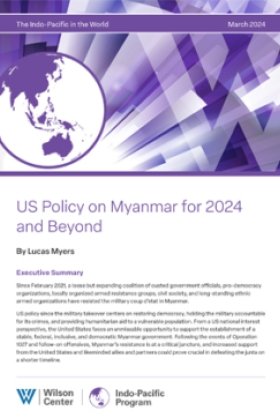You Are the Media: How Iranians "Democratized" the Media
Iran Davar Ardalan, Civic Journalist, Formerly of NPR News
Overview
As Iranian bloggers have increased their presence on the Internet and activists have harnessed the power of new social media, they have effectively "democratized" the media in Iran, according to journalist Iran Davar Ardalan. She indicated that this transformation is evident in the responses to Iran's disputed 2009 election, which demonstrated the role of the new media in Iran and the rise of citizen journalism.
The Middle East Program of the Woodrow Wilson Center hosted a multimedia presentation with Ardalan, a civic journalist and formerly of NPR News, entitled, "You Are the Media: How Iranians 'Democratized' the Media" on May 14, 2010. Haleh Esfandiari, Director of the Woodrow Wilson Center's Middle East Program, moderated the event.
Ardalan commented how "Iranians are ubiquitous online" since there are currently more than 60,000 active Persian blogs and 20 million active Internet users in Iran. She provided an overview of reformist media in Iran since 2001 and noted that the country was primed for the 2009 social media burst because of nearly a decade of transforming Iran's online media space. This transformation began with Hossein Derakhshan's blogging manifesto in 2001 and has continued throughout government crackdowns that started in 2003 and still remain part of Iran's media climate.
As part of her research, Ardalan interviewed Iranian journalists and bloggers both inside and outside of Iran. Some bloggers said they began monitoring the 2008 U.S. elections and then candidate Barack Obama's use of Facebook to disseminate news and create networks of activists, Ardalan noted. As a result of this monitoring and concern about the impact in Iran, the government began blocking Facebook, Twitter, Youtube, and other social media sites in May 2009 as a precaution leading up to the June 2009 presidential election. Another result of the crackdown is that Islamic blogs, which promote Islamic or political Islamist values or beliefs, have come to dominate the Internet. Ardalan remarked how the once vibrant online space has been significantly diminished and replaced by mostly Islamic blogs. Although not all Islamic blogs are political, the ones that are offer only one side of Iran's thriving civil society.
Within this context of Iranian media, Ardalan detailed the social media burst during June and July 2009, during which time she received hundreds of tweets, emails, photos, and videos from Iranian citizens throughout the country in response to the election. She indicated that Iranians who sent this information included students, mothers, members of the working class, and others who took part in this unprecedented direct communication. The most telling email for Ardalan stated, "Forward this to your friends: you are the media," which became a communication tactic for the reformist movement.
Such use of social media in Iran following the disputed election represented a "new way to get around the filters of the government" and also presented many potential dangers. Ardalan commented on a few lessons learned from the use of social media in Iran following the 2009 election including a need to authenticate sources, confirm facts, offer context for raw data, and provide transparency.
She remarked that this movement has been afoot for ten years as Iranians have increased their online presence and revolutionized journalism in Iran. While the government traditionally disseminated information from the top down, the rise of citizen journalism in Iran after the 2009 election symbolized a reversal of information dissemination, an effective "democratization" of media. Ardalan referred to an interview with journalist Roozbeh Mirebrahimi, who commented that this transformation crushed the traditional "monologue" and instead created a new "dialogue" in Iran.
Ardalan also discussed her research on the need to create more SMS and mobile related journalism software and technology in order to allow Iranians to continue the virtual dialogue they have fostered this past decade. She concluded her presentation by noting that freedom of expression and thought are not uniquely "Western" values but have existed in the East as part of Iranian consciousness for many centuries.
By Kendra Heideman, Middle East Program
Haleh Esfandiari, Middle East Program
Documents & Downloads
Hosted By

Middle East Program
The Wilson Center’s Middle East Program serves as a crucial resource for the policymaking community and beyond, providing analyses and research that helps inform US foreign policymaking, stimulates public debate, and expands knowledge about issues in the wider Middle East and North Africa (MENA) region. Read more
Thank you for your interest in this event. Please send any feedback or questions to our Events staff.









